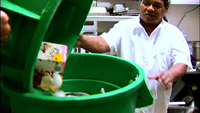

I started composting at home almost 2 years ago. My plan was to build a few vegetable garden beds, start growing some of my own food, and go from there. For my small gardening endeavors in the past I've used fish emulsion, coffee grinds, and egg shells as my typical sources of 'food' for my food. But it was time to step it up a notch. I wanted organic matter to build my soil, so what better way than to create my own.
It was easy to do. Next to my sink I have a handy container to hold the grinds, eggshells, carrot tops, uneaten bread crusts, and more. At the end of the day I add those organic ingredients to the compost bin, throw in some grass clippings or fallen leafs (depending on season), give it a mix, and let nature take over. What really surprised me, after doing this a few weeks, was how the amount of garbage going into my city collection bin was drastically reduced - by nearly half!
That got me thinking... What about restaurants? What do they do with all their leftover, uneaten food? What if they composted it? What's involved - is it that big of a deal? Why isn't every food establishment doing this?
I visited restaurateur Kathleen Hagberg, owner of the bijou, café in Portland, Oregon, to get her perspective of why she composts and why others do not. She says doing by example is always important, and ultimately, for the folks at the bijou, "It's as easy as throwing out the garbage."
What makes it possible is the cooperation between city officials and local businesses to provide the local infrastructure. In 2005, Portland's Office of Sustainability partnered with Oregon Metro to tackle the issue of the large amounts of food waste going to landfills. The result was Portland Composts!, a program designed to help restaurants and other food institutions learn how to easily incorporate a composting system into their business. In addition they connect interested parties with commercial waste haulers who collect and take the organic matter to a commercial composting facility in Washington.
Turning organic waste into a useful product, and at the same time helping to reduce carbon emissions provides an excellent example for other municipalities to follow. San Francisco recently made recycling and composting mandatory within the city limits.
Who'll follow, I wonder?
Originally posted on Cooking Up a Story